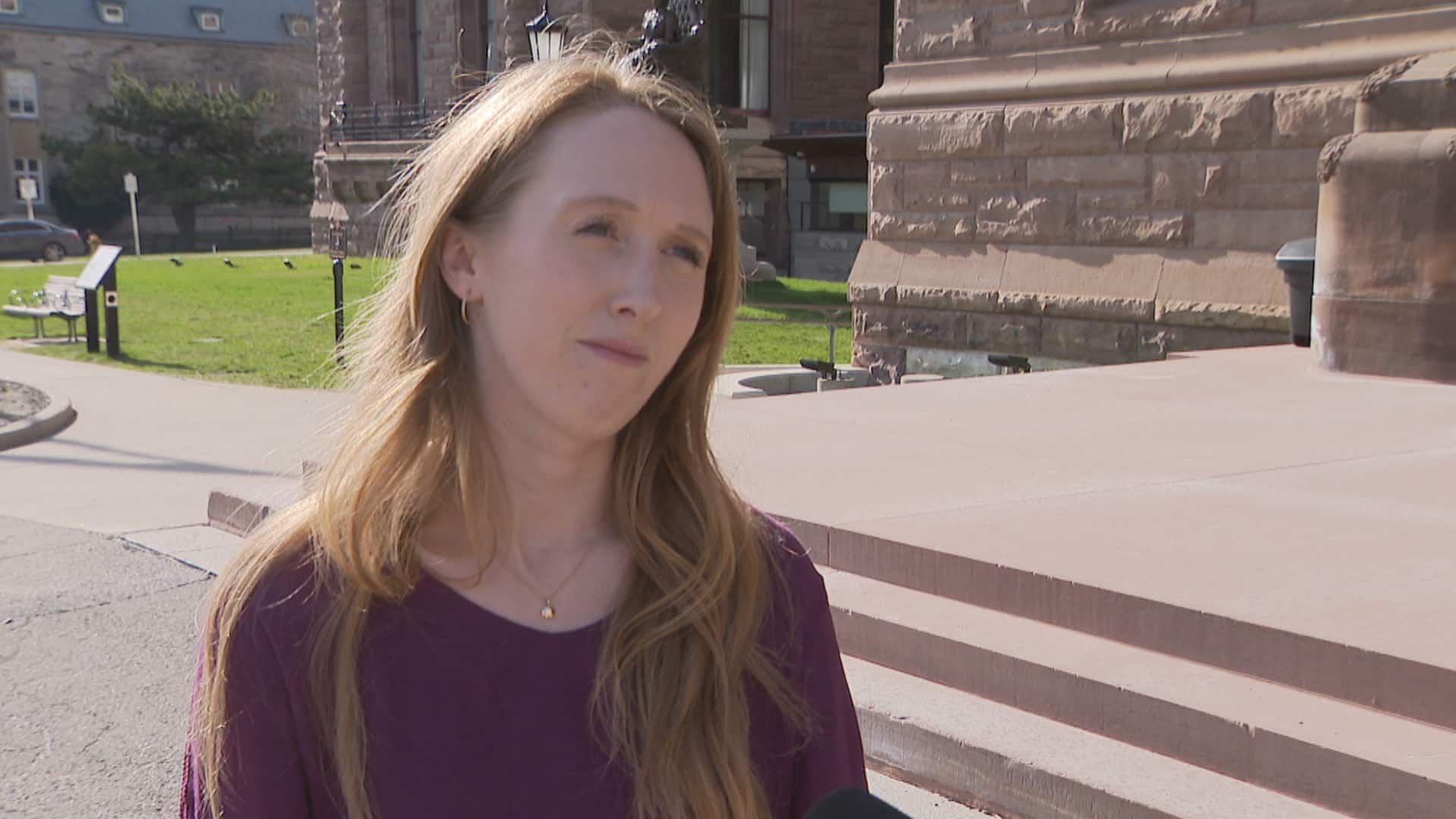Since eloping from foster care at age 13, Ashley has spent over a decade in search of a home.
Ashley says she was physically abused in her childhood, trafficked as a teenager and abused by her recent partner. She gave birth to her son at 16, and spent the next eight years or so living in and out of temporary shelters — years she describes as “stressful and scary.”
CBC Toronto has agreed to shield her full name over safety concerns.
Today, the 27-year-old lives in a newly-built two-bedroom apartment in Brampton with her son and two cats. That apartment is part of Armagh House, a non-profit organization that aims to help women and children escaping violence.
“It was the first time I really had a stable home and place to go,” she said through tears, recalling her journey to get to a spot in Brampton’s first transitional housing program.
Armagh House provides Peel’s only transitional housing — for a minimum of $120 per month to 30 per cent of someone’s salary for two to four years — until they can either afford a rental or get subsidized housing. The Brampton building consists 14 modern-looking one and two-bedroom apartment units for women and their children escaping, and opened this January.
But with 12 women and 16 kids already calling the facility home, it’s already full.
Intimate partner violence has topped the list of all crimes reported in Peel Region since 2022, according to Peel Public Health. And with cases on the rise, officials say they need millions of dollars in funding from the province to help tackle the problem.
The province says starting this year, the government will spend some $7 million per year to support transitional housing, but won’t say how much of that will go to the region.
Region has declared intimate violence an epidemic
Jannies Le, Armagh House’s executive director, says she’s concerned that with high demand and limited units, women like Ashley will go without housing or return to their abuser in a city where intimate partner violence was declared an epidemic last year.
She says women rely heavily on a system that’s already “inundated with need and services.”

Peel Public Health told CBC Toronto that as of 2022 – the most recent information available – police in the region responded to some 16,000 incidents of family and intimate partner violence. That amounts to nearly 43 incidents a day or two every hour. Women make up nearly 80 per cent of all victims in the region.
Nancy Polsinelli, commissioner of Peel Public Health, says that the cost to support its its network of agencies for victims is $10 million and that doesn’t include “extra funding pressures” for police, the Children’s Aid Society, child welfare or shelter beds. Another $18 million is needed each year to support victims of abuse, she said in a statement.
But the province has declined funding applications from some of Peel’s shelters and housing organization like Armagh House, says Polsinelli.
Last week, Brampton gave Armagh House $300,000 to provide residents with wrap-around services like therapy, educational courses and career counselling. Peel Region also spent some $2 million to help the non-profit to expand.
But Brampton Coun. Rowena Santos says the non-profit isn’t in the city’s jurisdiction and that transitional housing is the province’s responsibility.

“They have transitional housing for prisoners leaving prison, but they don’t fund transitional housing for women escaping gender based violence and intimate partner violence in the same way,” Santos said.
Beyond that, Peel currently meets only 19 per cent of its housing needs for the homeless, according to the region’s website. The city’s shelters are running 270 per cent over capacity, with overflow expenses projected at some $42 million, according to an October regional report.
Province says it’s focused on ‘concrete’ results
Patrick Bissett, a spokesperson for Ontario’s Minister of Children, Community and Social Services saysthe government is focused on supporting initiatives with “concrete, tangible results.”
Starting this year the government will spend some $7 million per year to support transitional housing, he said in an email.
“This will help more survivors to connect with community services and housing supports,” Bissett said.
The government is also spending $1.4 billion in a four-year plan to support survivors of gender-based violence, he says.
Bissett declined to answer how much of that funding will go to Peel Region.
For years, advocates have been calling intimate partner violence an epidemic. And on Wednesday, the province finally agreed. The Doug Ford government says it will support an opposition bill declaring intimate partner violence an epidemic in Ontario. Patrick Swadden reports.
Nearly 100 municipalities in Ontario have declared family and intimate partner violence an epidemic in less than a year. Earlier this month, the Ford government said it would support the NDP’s bill to declare intimate partner violence an epidemic provincewide.
Lack of resources can lead to ‘cycle of abuse’: victim
Le from Armagh House says Ontario’s “chronic underfunding” of transitional housing has forced the region to do much of the heavy lifting and made organizations rely on fundraising.
“The fact is it’s not enough…The need that we have in the Region of Peel supercedes the funding,” Le said.”The system is breaking already and it’s going to continue heading that way unless there’s a different response.”
For her part, Ashley, who is now studying health science at Queen’s University, says politicians need to understand that underfunding on intimate partner violence leaves women and kids to go through abuse.
She worries women like herself with kids will end up homeless if the province doesn’t provide more funding.
“If you’re young, don’t have a family and something like food, you’re in a vulnerable position… to be abused,” she said.
“It’s just going to be a cycle of abuse.”
